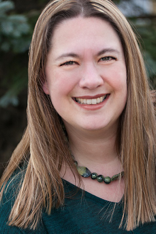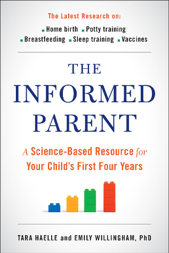Written by renowned science/health journalist Tara Haelle and Emily Willingham, a researcher and science writer, the book lays out the evidence to help new parents answer some of the most pressing questions that arise in the early years of their child’s life.
It has drawn praise from doctors, academics, authors and parents for its clear and evidence-based approach. We asked Tara Haelle what inspired her to write the book and what it says about immunisation.
[Scroll to the bottom to watch Tara Haelle’s TED talk: Why do parents fear vaccines?]
Vaccines Today: Where did the idea for The Informed Parent come from?
 Tara Haelle: Each of us had a different inspiration for the book. For me, I was writing about a variety of paediatric studies for my work as a health journalist, and I kept thinking I wanted to see all of the information about a specific topic in one place, a book that would pull together the most recent research on X, Y, Z without telling me what to do — just giving me the overview. I had a 2-year-old at the time and would have found a book like that useful, but when I went looking, despite thousands upon thousands of parenting books out there, I couldn’t find one. So I decided we needed to write it.
Tara Haelle: Each of us had a different inspiration for the book. For me, I was writing about a variety of paediatric studies for my work as a health journalist, and I kept thinking I wanted to see all of the information about a specific topic in one place, a book that would pull together the most recent research on X, Y, Z without telling me what to do — just giving me the overview. I had a 2-year-old at the time and would have found a book like that useful, but when I went looking, despite thousands upon thousands of parenting books out there, I couldn’t find one. So I decided we needed to write it.
VT: Do you both have children and, if so, to what extent has that influenced the content of the book?
TH: We have five boys between us, and mine are on the younger end of the spectrum, currently 2 and 5 years old. The only way I could say that my own parenting influenced the book’s content was that I had a sense of what questions I had and what I wanted or had wanted to know. Having kids of my own helped me come up with the various issues we might cover in the book – though we had to cut many. Beyond that and the “How I Did It” bits where Emily and I briefly explained what we did in our families with particular issues, my kids didn’t really influence the book.
VT: What are the take-home messages you give parents about vaccines?
TH: The most important thing to realise about vaccines is that the current childhood immunisation schedule has been extensively and thoroughly tested in just about every way possible, and the overall benefits of vaccines vastly, vastly outweigh their risks. That said, we understand why parents might fear vaccines or struggle to feel comfortable taking their children to get shots, especially when reminders of why those shots are needed — children with measles, polio, pertussis, etc. — don’t exist at the frequency they did before. That means most parents never have first (or even second) hand experience with these diseases and the spectre of a vaccine side effect looms larger in their brain. It’s true that vaccines — like everything else in our lives — are not completely without risk, but serious risks are fortunately extremely, extremely rare.
 VT: What do you say to parents who are considering opting out of the recommended schedule?
VT: What do you say to parents who are considering opting out of the recommended schedule?
TH: I first ask parents to tell me how they feel about vaccines and what they’ve been able to read and research to find out where they’re coming from. Are they picking and choosing certain vaccines? Getting them all but delaying some or all? Why? What specific concerns do they have? Then I would discuss the risks of delaying or opting out of specific vaccines and the eventual risks of those vaccines themselves, and I would answer any questions they have. I would not, however, tell them they “have” to vaccinate their child or that they’re wrong or foolish or ignoring the science. I would also expect that the conversation would become an ongoing one. If it’s a one-time encounter, I would encourage them to find a way to schedule an appointment with their child’s paediatrician where they could discuss this issue at length and explore resources such as those at the CDC, Immunization Action Coalition and the Children’s Hospital of Philadelphia Vaccine Education Center website.
VT: Do you think the evidence-based approach you have taken will appeal to people who already take a very rational approach to parenting while parents at higher risk of not vaccinating their kids will go elsewhere for advice?
TH: There’s a misconception that people who don’t vaccinate their children aren’t rational or don’t take a scientific approach to their parenting decisions. That’s very often not the case. Those parents usually feel that they are taking a rational, scientific approach and, in fact, they often are; they are simply doing so with limited information, with cognitive biases that we all have which interfere with their critical thinking, and/or with different values.
Many parents who do not vaccinate their children actually make other parenting choices that are evidence-based that vaccinating parents might eschew. It’s not as simple as believing that there are evidence-following parents and non-evidence-following parents.
Therefore, I think our book will appeal to a wide range of parents, pretty much anyone who wants the most up to date information possible about specific issues so they can take that information and incorporate it into their particular circumstances, culture, values, etc.
I also think it’s possible that when non-vaccinating parents see that we’ve presented evidence that supports other practices they already do, it might gain their trust in our non-judgmental and purely evidence-based approach enough so that they may revisit the evidence they have thus far relied upon for their vaccination decisions.
VT: You have written recently about false balance. How do you deal in this book with potentially controversial issues like vaccination, genetically modified food and breastfeeding without laying out ‘both sides’ of the debate?
TH: We are presenting the evidence on these topics as it exists in the scientific literature, so we don’t really need to worry about false balance. False balance occurs when someone intentionally tries to present approximately the same amount of information, attention, evidence, etc. about two “opposing” sides of an issue, but this book is under no obligation to present “both sides” of anything. Our goal is to present all the evidence – whether that’s “all sides” or “one side” – in context about a particular issue.
VT: What is your take on whether it’s wise to debunk myths about topics on which there is ample science-based information?
TH: It’s challenging to answer this question because we’re still learning about potential effects of debunking and specific ways of debunking information from a social psychology standpoint. In some contexts — and especially when done in certain ways — debunking can backfire, further entrenching a reader in their already existing belief system.
However, if the alternative is simply to let misinformation circulate unaddressed, that’s untenable as well. The key is to know your audience, be judicious with how you distribute and package your debunking, and follow best practices in keeping it as open and approachable as possible.





Pingback
June 21st, 2016
[…] author of The Informed Parent, offers her own experience of turning down a vaccine for her son and explains how her research led […]
Pingback
July 21st, 2016
[…] Read: New book helps parents make informed choices […]
Peter M B English
March 17th, 2017
This is another good one: Keep Calm: The New Mum’s Manual: Trust Yourself and Enjoy Your Baby by Ellie Cannon https://www.amazon.co.uk/dp/B00GIV5L86/ref=dp-kindle-redirect?_encoding=UTF8&btkr=1
The book is by the very sensible “media doctor” http://www.drellie.co.uk/ . (I was consulted on the vaccination section.)